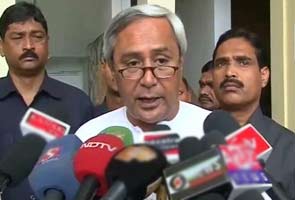After the launch of National Counter Terrorism Centre (NCTC) was put on hold due to protests by non-Congress ruled states, Chief Ministers of Gujarat, Tamil Nadu and Odisha have trained their guns at the Centre again opposing the proposed amendment to the Railway Protection Force or RPF Act.
Jayalalithaa and Naveen Patnaik joined their Gujarat counterpart Narendra Modi in asking Prime Minister Manmohan Singh to instruct Railway Ministry not to proceed with the move.
They expressed their concern over the move in separate letters to the Prime Minister, alleging that the Centre is trying take away the power of the states.
"I am constrained to point out that the Government of India is bent upon taking one step after another that is in conflict with the federal structure of the country and is against the interest of the people of this nation," Mr Patnaik wrote in his letter to the Prime Minister.
Mr Patnaik's stand has been seconded by Tamil Nadu Chief Minister J Jayalalithaa who also wrote to the PM with her protest. Ms Jayalalithaa in her letter said that amendment is an "attempt by the Centre to usurp powers of states."
She asked the PM to drop proposed changes to Railway Force Act, saying "providing powers of police to Railway Police Force (RDF) personnel violates the Police act."
The objections from Ms Jayalalithaa and Mr Patnaik place them indirectly against Mamata Banerjee, since the Railways Ministry is assigned to Dinesh Trivedi of her party.
Mr Patnaik, Ms Jayalalithaa and Ms Banerjee recently headlined a campaign that forced the Centre to suspend its plans for a new anti-terror agency called the National Counter Terrorism Centre (NCTC). Mr Patnaik succeeded in rallying around every chief minister of a non-Congress government together; they said the powers being given to the NCTC encroached upon the rights of states to handle law and order. The NCTC, meant to become operational on March 1, has been put on hold till the Home Ministry concludes consultations with state governments.
Mr Patnaik says that the amendment the Centre is considering to the Railways Act will give police officer-like powers to members of the Railways Protection Force or RPF.
His criticism stresses heavily on the fact that state governments have not been consulted about the proposed amendment. The Railways Ministry is assigned to Dinesh Trivedi of Ms Banerjee's party, the Trinamool Congress.
"It is understood that the Ministry of Home Affairs and the Ministry of Law and Justice, Government of India have already approved the proposal of the Railway Ministry," Mr Patnaik said in his letter.
Stating that the railway tracks were not outside the jurisdiction of the states through which they run, Mr Patnaik said that similar arguments could be advanced by other establishments such as the Central Industrial Security Force, who are in charge of protecting airports, industrial undertakings and other vital installations.
Jayalalithaa and Naveen Patnaik joined their Gujarat counterpart Narendra Modi in asking Prime Minister Manmohan Singh to instruct Railway Ministry not to proceed with the move.
They expressed their concern over the move in separate letters to the Prime Minister, alleging that the Centre is trying take away the power of the states.
"I am constrained to point out that the Government of India is bent upon taking one step after another that is in conflict with the federal structure of the country and is against the interest of the people of this nation," Mr Patnaik wrote in his letter to the Prime Minister.
Mr Patnaik's stand has been seconded by Tamil Nadu Chief Minister J Jayalalithaa who also wrote to the PM with her protest. Ms Jayalalithaa in her letter said that amendment is an "attempt by the Centre to usurp powers of states."
She asked the PM to drop proposed changes to Railway Force Act, saying "providing powers of police to Railway Police Force (RDF) personnel violates the Police act."
The objections from Ms Jayalalithaa and Mr Patnaik place them indirectly against Mamata Banerjee, since the Railways Ministry is assigned to Dinesh Trivedi of her party.
Mr Patnaik, Ms Jayalalithaa and Ms Banerjee recently headlined a campaign that forced the Centre to suspend its plans for a new anti-terror agency called the National Counter Terrorism Centre (NCTC). Mr Patnaik succeeded in rallying around every chief minister of a non-Congress government together; they said the powers being given to the NCTC encroached upon the rights of states to handle law and order. The NCTC, meant to become operational on March 1, has been put on hold till the Home Ministry concludes consultations with state governments.
Mr Patnaik says that the amendment the Centre is considering to the Railways Act will give police officer-like powers to members of the Railways Protection Force or RPF.
His criticism stresses heavily on the fact that state governments have not been consulted about the proposed amendment. The Railways Ministry is assigned to Dinesh Trivedi of Ms Banerjee's party, the Trinamool Congress.
"It is understood that the Ministry of Home Affairs and the Ministry of Law and Justice, Government of India have already approved the proposal of the Railway Ministry," Mr Patnaik said in his letter.
Stating that the railway tracks were not outside the jurisdiction of the states through which they run, Mr Patnaik said that similar arguments could be advanced by other establishments such as the Central Industrial Security Force, who are in charge of protecting airports, industrial undertakings and other vital installations.

No comments:
Post a Comment